Nursing Discussion: Roles of Nurses in Vaccinations and Negligence
VerifiedAdded on 2023/01/11
|5
|1162
|51
Discussion Board Post
AI Summary
This nursing discussion explores two critical aspects of nursing practice: vaccinations and negligence. The first part emphasizes the role of registered nurses in promoting adult vaccinations, highlighting the importance of staying informed about vaccine information, educating patients, and utilizing electronic health records for notifications. It also discusses the community benefits of vaccination, including disease prevention and reduced mortality rates. The second part delves into the legal aspects of nursing, specifically the four elements required to prove negligence, focusing on the challenge of linking patient injury directly to a breach of the standard of care. The discussion includes a personal reflection on a challenging patient interaction and the importance of accurate documentation to avoid negligence claims, referencing relevant literature to support the arguments.
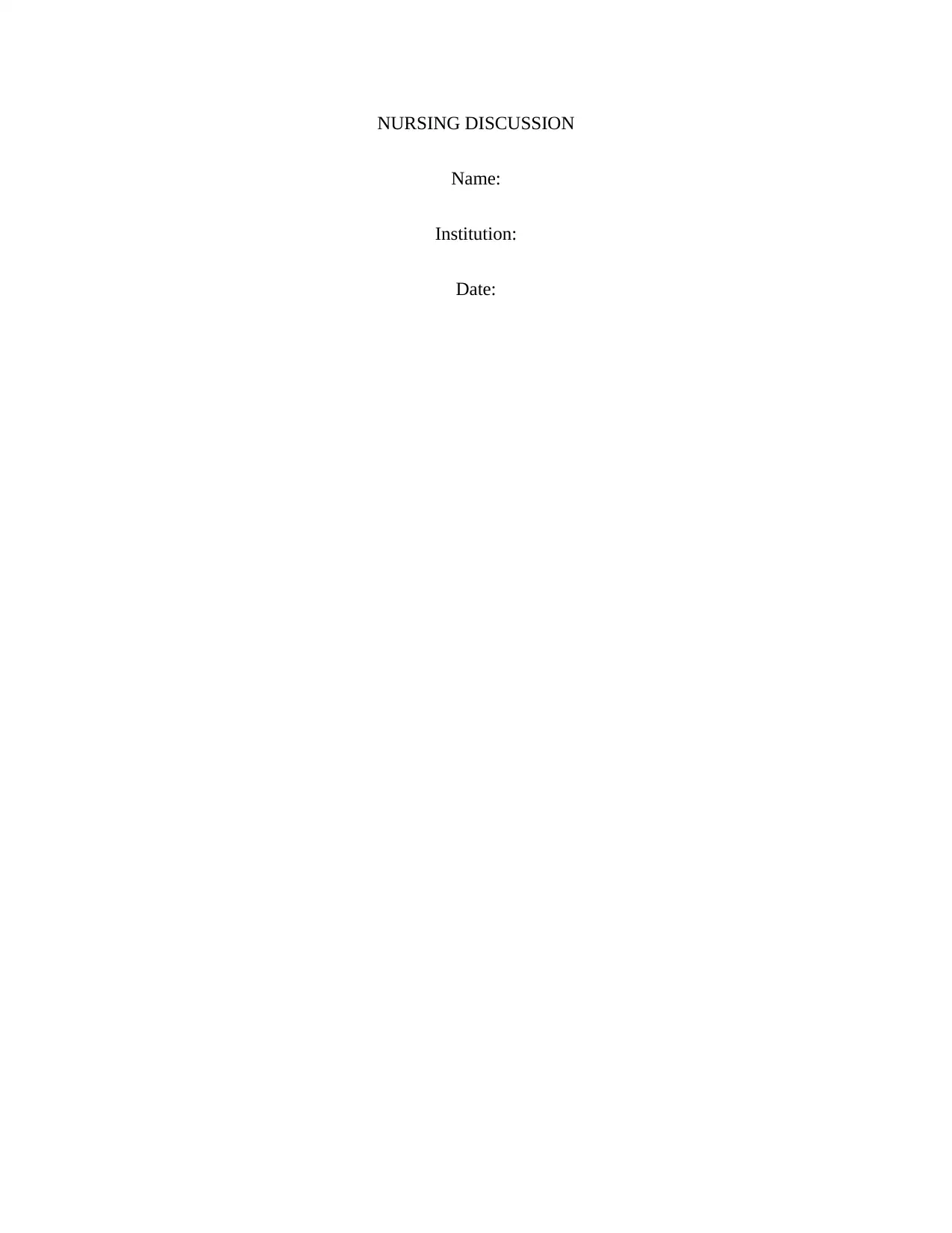
NURSING DISCUSSION
Name:
Institution:
Date:
Name:
Institution:
Date:
Paraphrase This Document
Need a fresh take? Get an instant paraphrase of this document with our AI Paraphraser
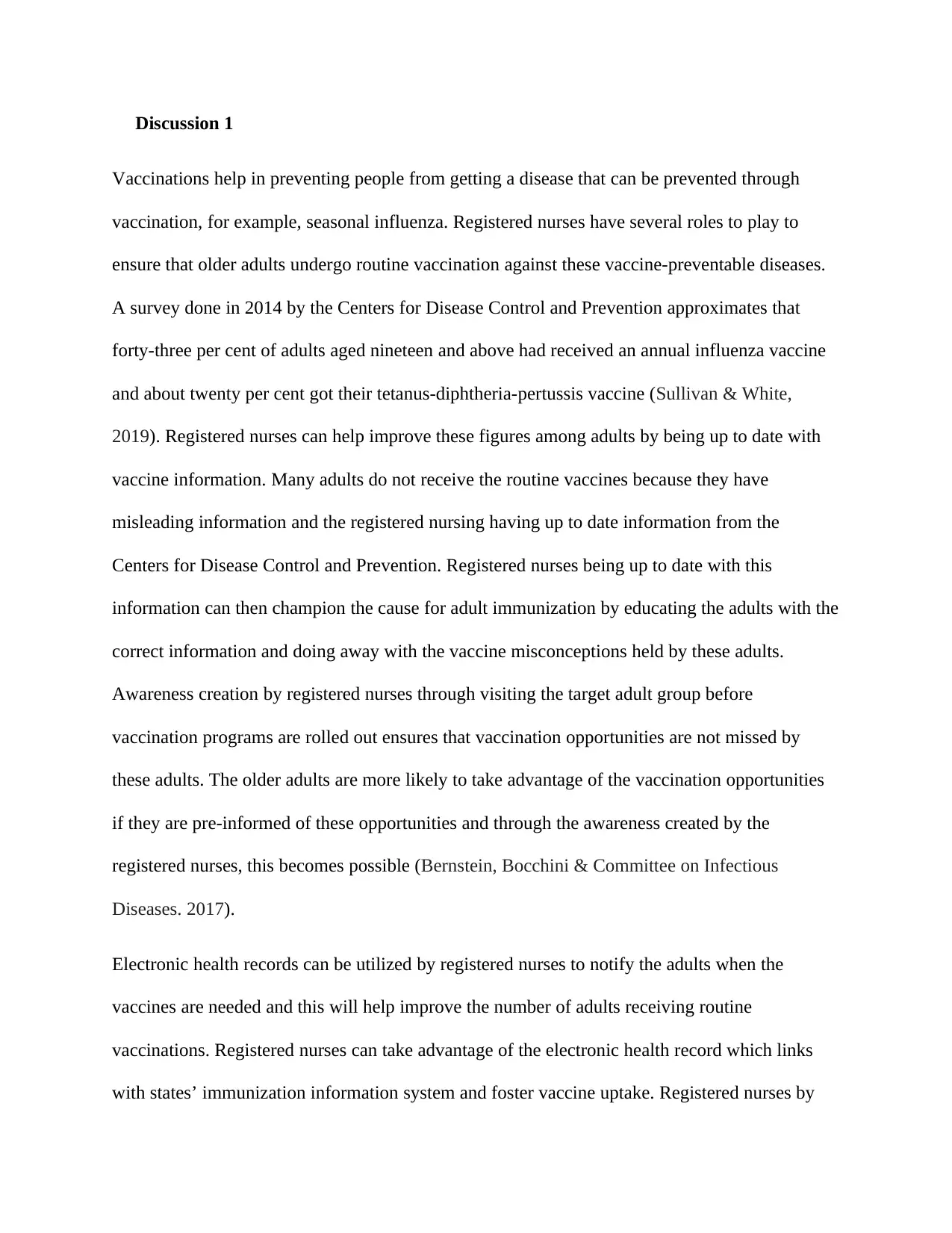
Discussion 1
Vaccinations help in preventing people from getting a disease that can be prevented through
vaccination, for example, seasonal influenza. Registered nurses have several roles to play to
ensure that older adults undergo routine vaccination against these vaccine-preventable diseases.
A survey done in 2014 by the Centers for Disease Control and Prevention approximates that
forty-three per cent of adults aged nineteen and above had received an annual influenza vaccine
and about twenty per cent got their tetanus-diphtheria-pertussis vaccine (Sullivan & White,
2019). Registered nurses can help improve these figures among adults by being up to date with
vaccine information. Many adults do not receive the routine vaccines because they have
misleading information and the registered nursing having up to date information from the
Centers for Disease Control and Prevention. Registered nurses being up to date with this
information can then champion the cause for adult immunization by educating the adults with the
correct information and doing away with the vaccine misconceptions held by these adults.
Awareness creation by registered nurses through visiting the target adult group before
vaccination programs are rolled out ensures that vaccination opportunities are not missed by
these adults. The older adults are more likely to take advantage of the vaccination opportunities
if they are pre-informed of these opportunities and through the awareness created by the
registered nurses, this becomes possible (Bernstein, Bocchini & Committee on Infectious
Diseases. 2017).
Electronic health records can be utilized by registered nurses to notify the adults when the
vaccines are needed and this will help improve the number of adults receiving routine
vaccinations. Registered nurses can take advantage of the electronic health record which links
with states’ immunization information system and foster vaccine uptake. Registered nurses by
Vaccinations help in preventing people from getting a disease that can be prevented through
vaccination, for example, seasonal influenza. Registered nurses have several roles to play to
ensure that older adults undergo routine vaccination against these vaccine-preventable diseases.
A survey done in 2014 by the Centers for Disease Control and Prevention approximates that
forty-three per cent of adults aged nineteen and above had received an annual influenza vaccine
and about twenty per cent got their tetanus-diphtheria-pertussis vaccine (Sullivan & White,
2019). Registered nurses can help improve these figures among adults by being up to date with
vaccine information. Many adults do not receive the routine vaccines because they have
misleading information and the registered nursing having up to date information from the
Centers for Disease Control and Prevention. Registered nurses being up to date with this
information can then champion the cause for adult immunization by educating the adults with the
correct information and doing away with the vaccine misconceptions held by these adults.
Awareness creation by registered nurses through visiting the target adult group before
vaccination programs are rolled out ensures that vaccination opportunities are not missed by
these adults. The older adults are more likely to take advantage of the vaccination opportunities
if they are pre-informed of these opportunities and through the awareness created by the
registered nurses, this becomes possible (Bernstein, Bocchini & Committee on Infectious
Diseases. 2017).
Electronic health records can be utilized by registered nurses to notify the adults when the
vaccines are needed and this will help improve the number of adults receiving routine
vaccinations. Registered nurses can take advantage of the electronic health record which links
with states’ immunization information system and foster vaccine uptake. Registered nurses by
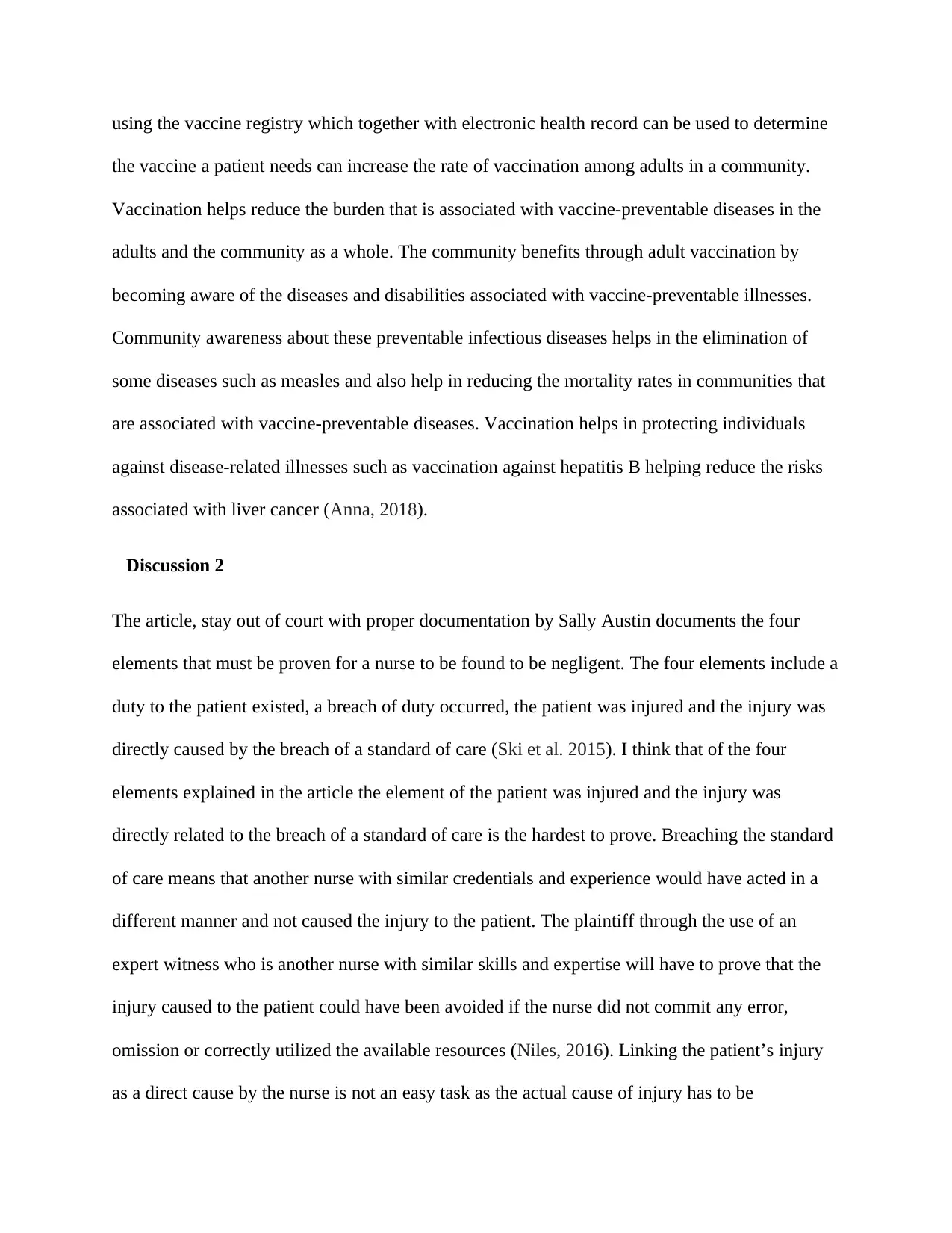
using the vaccine registry which together with electronic health record can be used to determine
the vaccine a patient needs can increase the rate of vaccination among adults in a community.
Vaccination helps reduce the burden that is associated with vaccine-preventable diseases in the
adults and the community as a whole. The community benefits through adult vaccination by
becoming aware of the diseases and disabilities associated with vaccine-preventable illnesses.
Community awareness about these preventable infectious diseases helps in the elimination of
some diseases such as measles and also help in reducing the mortality rates in communities that
are associated with vaccine-preventable diseases. Vaccination helps in protecting individuals
against disease-related illnesses such as vaccination against hepatitis B helping reduce the risks
associated with liver cancer (Anna, 2018).
Discussion 2
The article, stay out of court with proper documentation by Sally Austin documents the four
elements that must be proven for a nurse to be found to be negligent. The four elements include a
duty to the patient existed, a breach of duty occurred, the patient was injured and the injury was
directly caused by the breach of a standard of care (Ski et al. 2015). I think that of the four
elements explained in the article the element of the patient was injured and the injury was
directly related to the breach of a standard of care is the hardest to prove. Breaching the standard
of care means that another nurse with similar credentials and experience would have acted in a
different manner and not caused the injury to the patient. The plaintiff through the use of an
expert witness who is another nurse with similar skills and expertise will have to prove that the
injury caused to the patient could have been avoided if the nurse did not commit any error,
omission or correctly utilized the available resources (Niles, 2016). Linking the patient’s injury
as a direct cause by the nurse is not an easy task as the actual cause of injury has to be
the vaccine a patient needs can increase the rate of vaccination among adults in a community.
Vaccination helps reduce the burden that is associated with vaccine-preventable diseases in the
adults and the community as a whole. The community benefits through adult vaccination by
becoming aware of the diseases and disabilities associated with vaccine-preventable illnesses.
Community awareness about these preventable infectious diseases helps in the elimination of
some diseases such as measles and also help in reducing the mortality rates in communities that
are associated with vaccine-preventable diseases. Vaccination helps in protecting individuals
against disease-related illnesses such as vaccination against hepatitis B helping reduce the risks
associated with liver cancer (Anna, 2018).
Discussion 2
The article, stay out of court with proper documentation by Sally Austin documents the four
elements that must be proven for a nurse to be found to be negligent. The four elements include a
duty to the patient existed, a breach of duty occurred, the patient was injured and the injury was
directly caused by the breach of a standard of care (Ski et al. 2015). I think that of the four
elements explained in the article the element of the patient was injured and the injury was
directly related to the breach of a standard of care is the hardest to prove. Breaching the standard
of care means that another nurse with similar credentials and experience would have acted in a
different manner and not caused the injury to the patient. The plaintiff through the use of an
expert witness who is another nurse with similar skills and expertise will have to prove that the
injury caused to the patient could have been avoided if the nurse did not commit any error,
omission or correctly utilized the available resources (Niles, 2016). Linking the patient’s injury
as a direct cause by the nurse is not an easy task as the actual cause of injury has to be
⊘ This is a preview!⊘
Do you want full access?
Subscribe today to unlock all pages.

Trusted by 1+ million students worldwide
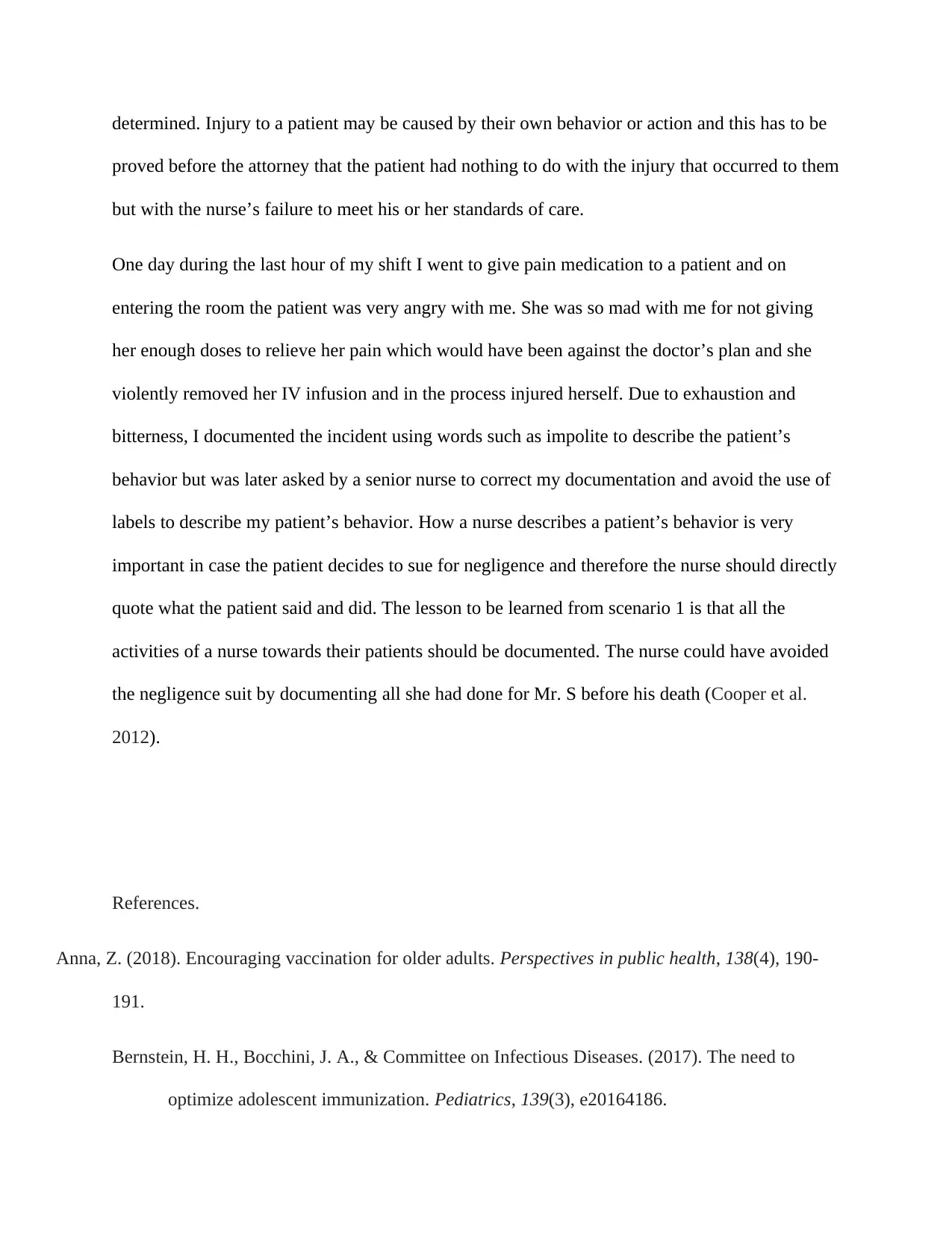
determined. Injury to a patient may be caused by their own behavior or action and this has to be
proved before the attorney that the patient had nothing to do with the injury that occurred to them
but with the nurse’s failure to meet his or her standards of care.
One day during the last hour of my shift I went to give pain medication to a patient and on
entering the room the patient was very angry with me. She was so mad with me for not giving
her enough doses to relieve her pain which would have been against the doctor’s plan and she
violently removed her IV infusion and in the process injured herself. Due to exhaustion and
bitterness, I documented the incident using words such as impolite to describe the patient’s
behavior but was later asked by a senior nurse to correct my documentation and avoid the use of
labels to describe my patient’s behavior. How a nurse describes a patient’s behavior is very
important in case the patient decides to sue for negligence and therefore the nurse should directly
quote what the patient said and did. The lesson to be learned from scenario 1 is that all the
activities of a nurse towards their patients should be documented. The nurse could have avoided
the negligence suit by documenting all she had done for Mr. S before his death (Cooper et al.
2012).
References.
Anna, Z. (2018). Encouraging vaccination for older adults. Perspectives in public health, 138(4), 190-
191.
Bernstein, H. H., Bocchini, J. A., & Committee on Infectious Diseases. (2017). The need to
optimize adolescent immunization. Pediatrics, 139(3), e20164186.
proved before the attorney that the patient had nothing to do with the injury that occurred to them
but with the nurse’s failure to meet his or her standards of care.
One day during the last hour of my shift I went to give pain medication to a patient and on
entering the room the patient was very angry with me. She was so mad with me for not giving
her enough doses to relieve her pain which would have been against the doctor’s plan and she
violently removed her IV infusion and in the process injured herself. Due to exhaustion and
bitterness, I documented the incident using words such as impolite to describe the patient’s
behavior but was later asked by a senior nurse to correct my documentation and avoid the use of
labels to describe my patient’s behavior. How a nurse describes a patient’s behavior is very
important in case the patient decides to sue for negligence and therefore the nurse should directly
quote what the patient said and did. The lesson to be learned from scenario 1 is that all the
activities of a nurse towards their patients should be documented. The nurse could have avoided
the negligence suit by documenting all she had done for Mr. S before his death (Cooper et al.
2012).
References.
Anna, Z. (2018). Encouraging vaccination for older adults. Perspectives in public health, 138(4), 190-
191.
Bernstein, H. H., Bocchini, J. A., & Committee on Infectious Diseases. (2017). The need to
optimize adolescent immunization. Pediatrics, 139(3), e20164186.
Paraphrase This Document
Need a fresh take? Get an instant paraphrase of this document with our AI Paraphraser
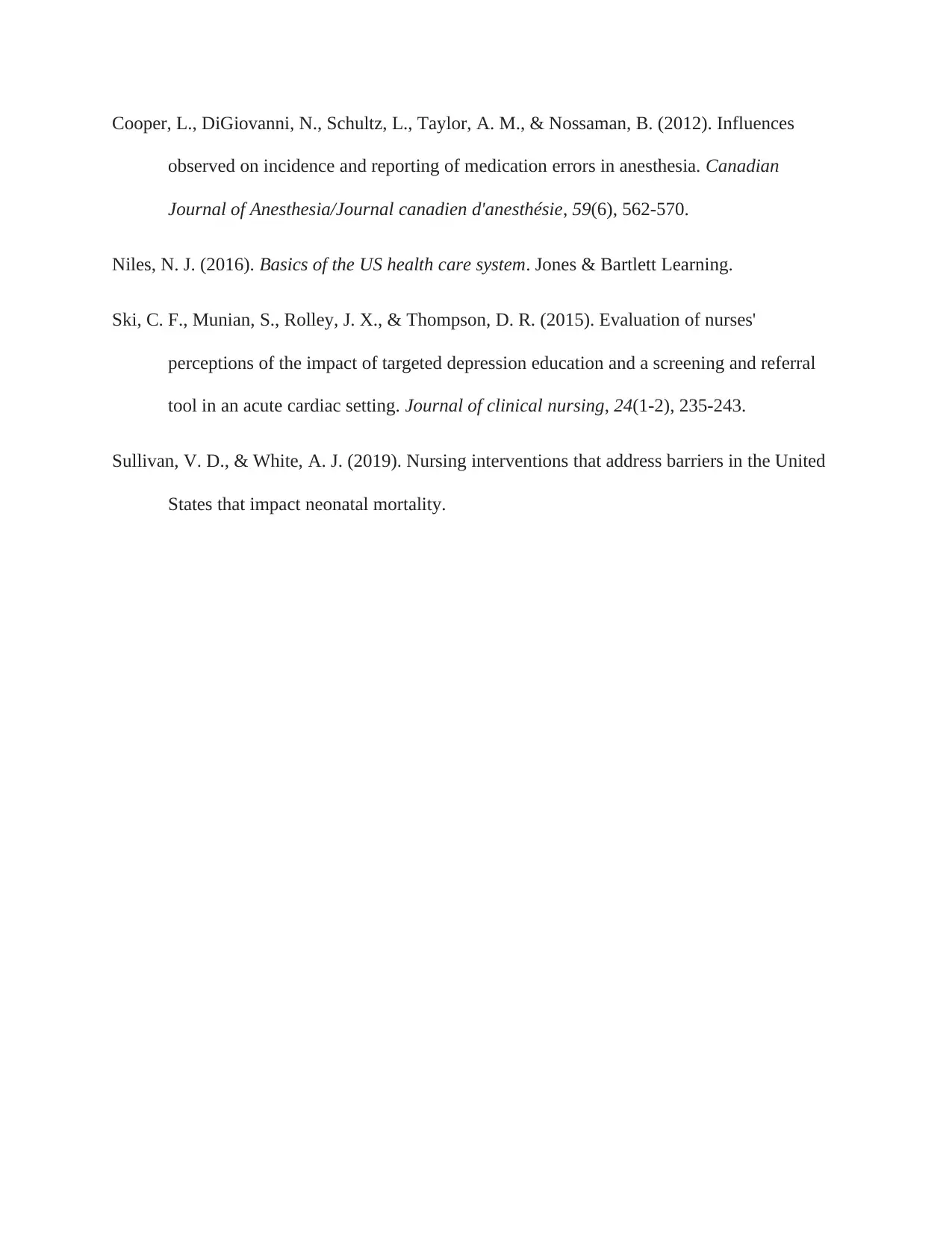
Cooper, L., DiGiovanni, N., Schultz, L., Taylor, A. M., & Nossaman, B. (2012). Influences
observed on incidence and reporting of medication errors in anesthesia. Canadian
Journal of Anesthesia/Journal canadien d'anesthésie, 59(6), 562-570.
Niles, N. J. (2016). Basics of the US health care system. Jones & Bartlett Learning.
Ski, C. F., Munian, S., Rolley, J. X., & Thompson, D. R. (2015). Evaluation of nurses'
perceptions of the impact of targeted depression education and a screening and referral
tool in an acute cardiac setting. Journal of clinical nursing, 24(1-2), 235-243.
Sullivan, V. D., & White, A. J. (2019). Nursing interventions that address barriers in the United
States that impact neonatal mortality.
observed on incidence and reporting of medication errors in anesthesia. Canadian
Journal of Anesthesia/Journal canadien d'anesthésie, 59(6), 562-570.
Niles, N. J. (2016). Basics of the US health care system. Jones & Bartlett Learning.
Ski, C. F., Munian, S., Rolley, J. X., & Thompson, D. R. (2015). Evaluation of nurses'
perceptions of the impact of targeted depression education and a screening and referral
tool in an acute cardiac setting. Journal of clinical nursing, 24(1-2), 235-243.
Sullivan, V. D., & White, A. J. (2019). Nursing interventions that address barriers in the United
States that impact neonatal mortality.
1 out of 5
Related Documents
Your All-in-One AI-Powered Toolkit for Academic Success.
+13062052269
info@desklib.com
Available 24*7 on WhatsApp / Email
![[object Object]](/_next/static/media/star-bottom.7253800d.svg)
Unlock your academic potential
Copyright © 2020–2025 A2Z Services. All Rights Reserved. Developed and managed by ZUCOL.





